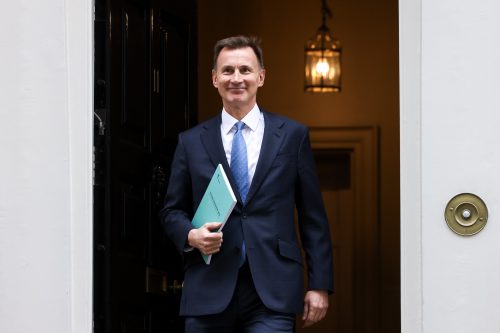Chancellor in £20bn ‘boost for business investment’ to improve UK’s productivity

Chancellor Jeremy Hunt has set out “an autumn statement for growth” as he sought to boost productivity, business investment and the Conservatives’ election prospects.
Boosted by the Government achieving its target to halve inflation by the end of the year, he said: “Our plan for the British economy is working, but the work is not done”.
Key announcements in his 52-minute speech including increases in the National Living Wage and tax cuts had been trailed or teased ahead of his speech, which was focused on productivity and “making work pay”.
A general election is required within 14 months and expected within 12, meaning there is likely only to be the Budget in spring before voters go to the ballot boxes.
This makes the changes announced today even more important than usual – partly because changes very close to polling day can be seen as “election bribes” but also because of the time it takes between a policy announcement and individuals potentially noticing a difference in their pockets.
His “making work pay” measures were led by two headline-grabbing announcements, alongside putting a squeeze on people claiming out-of-work benefits to push them to look for work.
The main National Insurance rate – which is paid on earnings between £12,570 and £50,268 – was cut from 12% to 10% and will be pushed through to take effect from January 6.
The National Living Wage has been extended to include 21 and 22 year olds and will go up by £1.02 to £11.44 per hour from April. The National Minimum Wage, for 18-20 year olds, will also increase by £1.11 to £8.60 per hour.
“We need higher productivity”, said Hunt, for GDP to increase faster than the OBR’s forecast of 0.6% this year and 0.7% next year.
He highlighted that the private sector is more productive in countries like the United States, Germany and France because they invest on average two percentage points more of GDP every year.
He added: “The 110 measures I take today help close that gap by boosting business investment by £20bn a year.”
Hunt had introduced a capital allowance tax scheme, full expensing, in the last Budget that allowed UK companies to deduct 100% of the cost of capital equipment. It was initially for a three-year period but today he revealed it has now been made permanent.
He said: “This is the biggest-ever boost for business investment in modern times, a decisive step towards closing the productivity gap with other major economies and the most effective way we can raise wages and living standards for every family in the country.”
The Chancellor revealed three new investment zones focused on advanced manufacturing to be based in the West Midlands, East Midlands and Greater Manchester.
“Together they are expected to catalyse £3bn of investment and 65,000 jobs”, he said.
A life sciences investment zone for West Yorkshire was announced earlier this week, while there will also be a second Welsh investment zone, in Wrexham and Flintshire.
Hunt also announced plans to extend financial incentives for investment zones and freeports from five years to 10 years.
There will be new devolution deals for four areas, including a long-awaited agreement for Hull and East Yorkshire.
The Chancellor revealed support for innovative industries. A longer-term strategy for key industries is to be backed by £4.5bn of funding, including £2bn support for the automotive industry, £975m for aerospace, and £520m for the life sciences sector.
In addition, £500m will be invested over two years to fund further innovation centres “to make us an AI powerhouse”.








